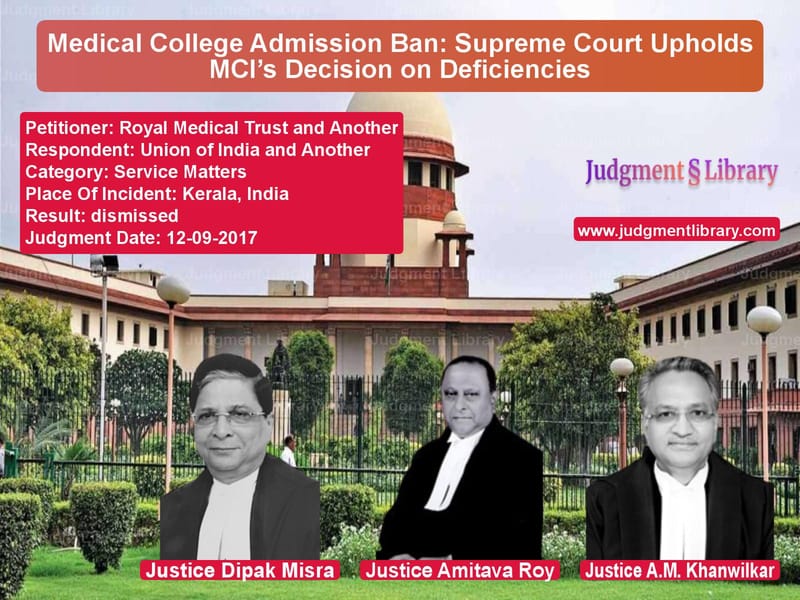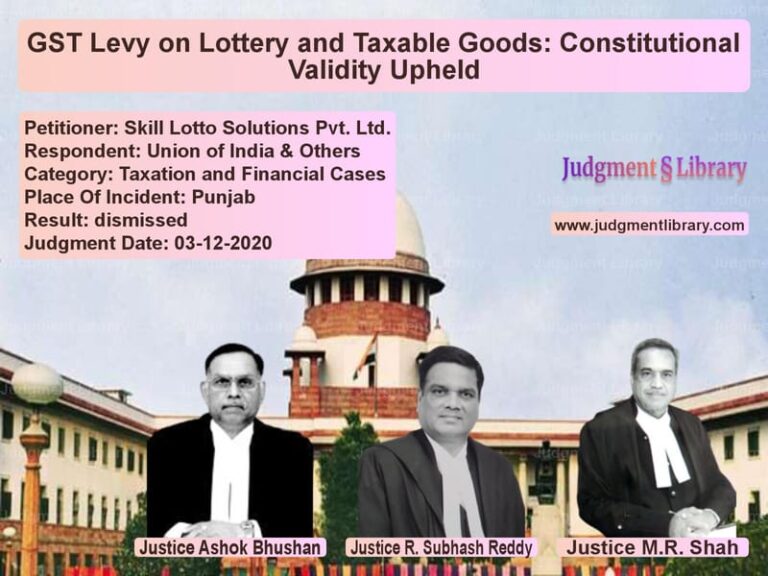Medical College Admission Ban: Supreme Court Upholds MCI’s Decision on Deficiencies
The case of Royal Medical Trust and Another v. Union of India and Another involved a dispute over the Medical Council of India’s (MCI) decision to debar Kerala Medical College, Palakkad, from admitting students for two academic years due to deficiencies in faculty, infrastructure, and hospital facilities. The Supreme Court, in its judgment dated September 12, 2017, upheld the decision of the MCI and the Union Government, reinforcing the importance of maintaining quality medical education in India.
Background of the Case
The petitioner, Royal Medical Trust, had applied for permission to establish a new medical college under Section 10-A of the Indian Medical Council Act, 1956. After an initial rejection due to deficiencies, the college was granted conditional permission for the academic year 2016-17 following an intervention by the Oversight Committee. However, subsequent inspections found severe deficiencies, leading to an order from the Union Government on May 31, 2017, debarring the college from admitting students for the 2017-18 and 2018-19 academic years and authorizing MCI to encash the Rs. 2 crore bank guarantee submitted by the institution.
The petitioner challenged this decision before the High Court of Kerala, which directed the Union Government to reconsider its decision. After a fresh review, the Union Government reiterated its decision on August 14, 2017, leading the petitioner to approach the Supreme Court.
Legal Issues
- Was the MCI justified in debarring the institution based on its inspection findings?
- Did the Union Government provide adequate reasoning in its order?
- Should the Supreme Court intervene in expert regulatory decisions regarding medical education?
Arguments by the Petitioner (Royal Medical Trust)
The petitioner contended:
- The inspection by the MCI was arbitrary and failed to consider compliance submissions.
- The deficiencies noted, including faculty shortages and infrastructure gaps, were either minor or had been rectified.
- Other medical colleges with similar deficiencies were granted permission, indicating discriminatory treatment.
- The Central Government’s order was unreasoned and should be set aside.
Arguments by the Respondents (Union of India & MCI)
The respondents argued:
- The deficiencies identified were severe and persistent, including a faculty shortage of 13.84% and bed occupancy levels below 50%.
- The institution failed to meet the minimum requirements set by the MCI, justifying the admission ban.
- The Supreme Court had consistently upheld the need for stringent regulation of medical colleges to ensure quality education.
- Judicial review should not extend to overriding expert regulatory decisions unless they are arbitrary or perverse.
Supreme Court’s Analysis
On the Justification of MCI’s Decision
The Supreme Court ruled that the MCI’s decision was well-founded, noting:
“The petitioners are not entitled to Letter of Permission (LOP) for the academic session 2017-2018. The controversy for grant of LOP for the academic year 2017-2018 should come to an end and cannot become an event that defeats time.”
On the Application of Judicial Review
The Court reiterated that judicial review does not extend to interfering with expert regulatory decisions unless there is clear evidence of arbitrariness. It stated:
“The Court does not sit in appeal over such orders. When the order is absolutely perverse and arbitrary, it should be overturned in the exercise of power of judicial review.”
On the Due Process Followed
The Court found that the institution was given multiple opportunities to present its case, and its deficiencies were thoroughly reviewed. It held:
“The order passed by the Central Government is not in consonance with the judgments rendered by this Court. However, the final order is reasoned and cannot be said to be arbitrary.”
Final Judgment
The Supreme Court dismissed the petition, affirming the two-year admission ban and permitting MCI to encash the Rs. 2 crore bank guarantee. However, it allowed the institution to apply for recognition for the academic year 2018-19 and directed MCI to conduct a fresh inspection within two months.
“The applications submitted for 2017-2018 shall be treated as applications for 2018-2019, and the petitioners shall keep the bank guarantee deposited with MCI alive.”
Conclusion and Impact
This ruling underscores the Supreme Court’s commitment to maintaining high standards in medical education. The key takeaways from this judgment are:
- Regulatory authorities have the discretion to debar institutions that fail to meet the prescribed standards.
- Judicial review does not extend to overriding expert regulatory decisions unless they are manifestly arbitrary.
- Medical colleges must ensure full compliance with infrastructure and faculty requirements to avoid regulatory action.
By upholding the admission ban, the Supreme Court has sent a strong message that medical institutions must adhere to regulatory norms to ensure quality education and public health safety.
Don’t miss out on the full details! Download the complete judgment in PDF format below and gain valuable insights instantly!
Download Judgment: Royal Medical Trust vs Union of India and A Supreme Court of India Judgment Dated 12-09-2017.pdf
Direct Downlaod Judgment: Direct downlaod this Judgment
See all petitions in Recruitment Policies
See all petitions in Public Sector Employees
See all petitions in Legal Malpractice
See all petitions in Judgment by Dipak Misra
See all petitions in Judgment by Amitava Roy
See all petitions in Judgment by A M Khanwilkar
See all petitions in dismissed
See all petitions in supreme court of India judgments September 2017
See all petitions in 2017 judgments
See all posts in Service Matters Category
See all allowed petitions in Service Matters Category
See all Dismissed petitions in Service Matters Category
See all partially allowed petitions in Service Matters Category







